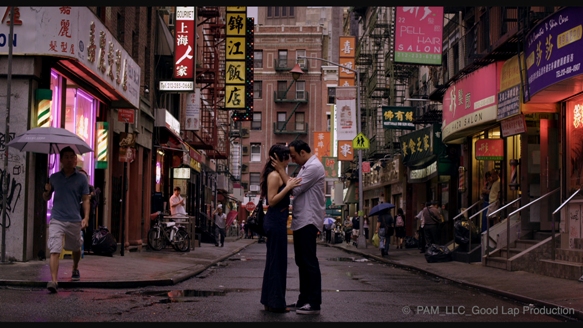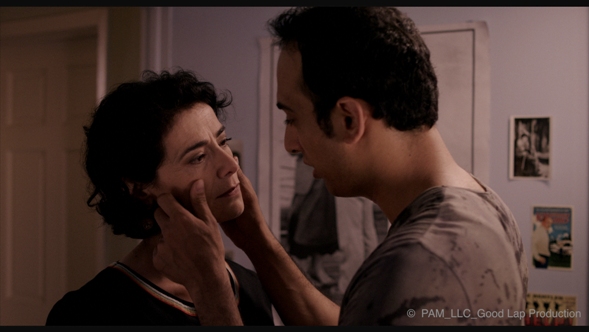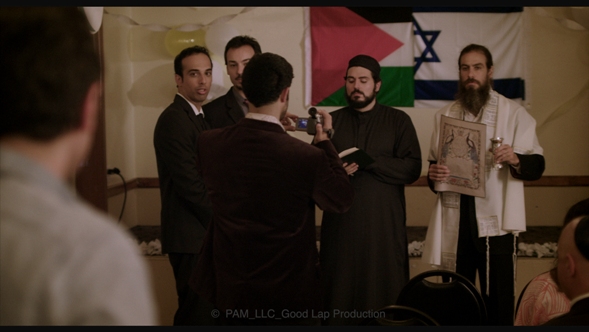
New York is the original melting pot: the place with enough space for anyone to be whoever they want to be. Except, perhaps, for an over-sexed and under-serviced 30 year old Palestinian-American living at home with his parents.
Arafat, the hapless anti-hero of Peace After Marriage (also known as Only In New York, which I think is a bit more apt) has plenty of problems, most of his own creation. A compulsive porn problem leads to him losing his job (Gentlemen: Some things should kept for loving and consensual relationships, and if not then at least should be kept private); his parents, despairing for their own child, try to foist every Muslim girl in sight upon him, with predictably disastrous consequences. His long-suffering mother tries hard to make allowances for him, but his irascible father cannot or will not. Arafat would rather believe that his entrenched – and completely involuntary – case of coitus reservatus is down to parental interference in his love life, but the truth is that he simply hasn’t a clue when it comes to the opposite sex. Arafat has somehow contrived to have a sex problem in the least repressed city in America. That does take some doing.

Starring, written and co-directed by the Palestine-American stand-up comic and writer Ghazi Albuliwi, Peace After Marriage – which will open the Jerusalem Jewish Film Festival, starting in Jerusalem this weekend – has a cheerful charm, despite its smutty foundations. It comes largely down to Albuliwi in the lead role, I feel. He has a hapless hangdog air about him, and one can’t but feel a little bit sorry for him, despite his one track mind. Unsurprisingly, he comes to understand that he can’t continue to live the way he does; at a Sexual Compulsive Anonymous meeting, he meets Kenny (Mark Lucaj) who points out the obvious: he really needs to get himself laid, pronto.
Woody Allen once said that the good thing about masturbation was that at least you know that you are making out with someone you really love. I’m not sure one can say the same about Arafat, who is a terribly confused and rootless young man. As it happens, Albuliwi evokes – quite deliberately, I think – Allen’s nerdiness and neediness from films like Everything You Always Wanted To Know About Sex *But were Afraid To Ask. Scoring with the chicks isn’t much use if one still lives at home with one’s parents, so Kenny comes up with an idea; why not contract a visa marriage with an illegal immigrant? There’s the money, and – since the two would be expected to prove, at some point, that they are a genuine couple – there’s also a good chance of sex too. What could go wrong?
Everything, if the proposed “bride” is an Israeli Jew, for instance. Or, as Arafat puts it when he tries to explain part (not the money part, obviously) of his new relationship to his horrified parents: “We call it Palestine. She doesn’t.”
Once Peace After Marriage settles down, it takes its cues from a well-trodden path. There’s the sham marriage shenanigans of, say, Gerald Depardieu and Andi MacDowell in Green Card; then there is the are-we-laughing-with-or-laughing-at-the-ethnics knockabout comedy that recalls East is East. As it happens, Peace After Marriage lacks the charm of the former but is a great deal less patronising than the latter; its main weakness is that it comes across as just that bit too disorganised, sort of like a collection of comedy sketches stitched together in a bit of a hurry.

Proceedings are largely predictable, albeit leavened with quite a few instances of genuine laugh out loud hilarity (the marriage for instance, officiated by a Rabbi and an Imam, quickly degenerates into a competitive preaching event). Support acting varies; Einat Tubi as Miki, the blushing bride is competent but no more, whilst the sublime Hiam Abbass is wasted in a role that doesn’t give her very much to do. But all things said, it is a well intentioned and certainly unique take on Palestinian-Israeli relations. A couple of curious, cutting interludes, which involve Arafat auditioning for a role in a community theatre play – the suicide bomber looking forward to his 72 virgins on the other side – did leave me wondering whether Albuliwi might have wilfully restrained himself in order to get a bigger point across.
Peace After Marriage (2013)
Directed by Ghazi Albuliwi and Bandar Albuliwi, Written by Ghazi Albuliwi
Starring Ghazi Albuliwi, Hiam Abbass, Einat Tubi, Hany Kamal
86 minutes, English/Arabic/Hebrew w. English subtitles.





